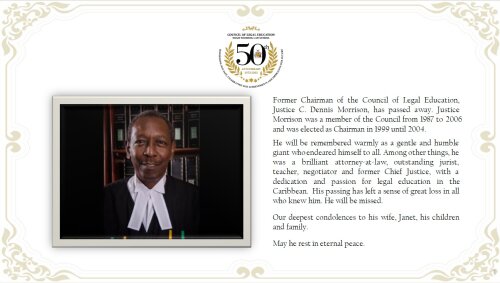Best Citizenship Lawyers in Trinidad and Tobago
Share your needs with us, get contacted by law firms.
Free. Takes 2 min.
Or refine your search by selecting a city:
List of the best lawyers in Trinidad and Tobago
About Citizenship Law in Trinidad and Tobago
Citizenship law in Trinidad and Tobago is primarily governed by the Citizenship Act, Chapter 1:50 of the Laws of Trinidad and Tobago, which outlines how citizenship can be acquired, renounced, and revoked. There are several pathways to obtaining citizenship, including by birth, descent, marriage, or naturalization. This legal framework aims to regulate the conditions under which individuals can become citizens, ensuring fairness and adherence to national policies.
Why You May Need a Lawyer
While the process of acquiring citizenship can be straightforward, several situations may necessitate the assistance of a lawyer:
- Complex Application Processes: If your case involves unique circumstances or requires proving certain qualifications, a lawyer can help navigate these complexities.
- Application Denial: If your application for citizenship is denied, legal assistance can be critical in understanding the reasons and in potentially filing appeals.
- Legal Representation: In cases of disputed citizenship or when under investigation by immigration authorities, having legal representation ensures your rights are protected.
- Revocation Issues: If facing citizenship revocation, a lawyer can provide essential defense to maintain your citizenship status.
Local Laws Overview
Trinidad and Tobago's citizenship laws are shaped by both domestic statutes and constitutional provisions. Key points include:
- Birthright Citizenship: Individuals born in Trinidad and Tobago are typically eligible for citizenship unless neither parent is a citizen or legal resident.
- Citizenship by Descent: Those born abroad to at least one citizen of Trinidad and Tobago can apply for citizenship.
- Naturalization: Foreign nationals may apply for citizenship after legally residing in the country for a specified duration, usually five years.
- Marriage: Foreign spouses of Trinidad and Tobago citizens can apply for citizenship after residing in the country for a period and proving the marriage’s legitimacy.
- Dual Citizenship: Trinidad and Tobago allows for dual citizenship, though the process may vary for those with initial citizenships requiring renunciation.
Frequently Asked Questions
What is the first step to apply for citizenship in Trinidad and Tobago?
The initial step is usually to determine your eligibility under the specified categories of citizenship. Gathering required documentation is essential before submitting an application.
Can I apply for citizenship if I was not born in Trinidad and Tobago?
Yes, you may apply if you qualify by descent, marriage, or naturalization and fulfill the residency requirements.
How long does it typically take to process a citizenship application?
The process duration can vary, but it generally takes several months. It's advisable to consult with immigration authorities or a lawyer for current timelines.
Is dual citizenship allowed in Trinidad and Tobago?
Yes, dual citizenship is permitted, allowing individuals to maintain citizenship in Trinidad and Tobago in addition to another country.
What happens if my citizenship application is denied?
If denied, you have the opportunity to understand the reasons for denial and may choose to appeal the decision with legal assistance.
Can a child born in Trinidad and Tobago to foreign parents gain citizenship?
In general, children born to foreign parents who have legal residency in Trinidad and Tobago are eligible for citizenship.
What documentation is required for a citizenship application?
Required documents typically include proof of identity, birth certificates, residency records, and other relevant documents, depending on your category of application.
Are there any fees associated with applying for citizenship?
Yes, application processing fees apply. These fees can vary, so it’s best to check with the relevant government offices for updated information.
What are my rights as a citizen of Trinidad and Tobago?
As a citizen, you have rights including voting in elections, receiving a passport, accessing public services, and residing and working indefinitely in Trinidad and Tobago.
Can my citizenship be revoked?
Yes, citizenship can be revoked under certain conditions, such as fraudulent application information or actions contrary to national allegiance.
Additional Resources
For further assistance, consider reaching out to the following resources:
- Ministry of National Security, Trinidad and Tobago Immigration Division: Offers official guidelines and forms for citizenship applications.
- Legal Aid and Advisory Authority: Provides legal assistance and advice for those who meet the criteria for aid.
- Citizenship Law Firms: Local law firms specializing in immigration and citizenship law can provide detailed guidance and representation.
Next Steps
If you believe you need legal assistance regarding citizenship in Trinidad and Tobago, consider taking the following steps:
- Consult with an immigration lawyer to evaluate your eligibility and guide you through the process.
- Gather all necessary documentation and information to support your application or legal case.
- Contact the relevant government agencies or legal bodies for official guidance and application forms.
- Stay informed about any changes in citizenship law and policies that may affect your status or application.
Taking informed and timely action is crucial for a successful citizenship application or resolution of any related legal issues.
Lawzana helps you find the best lawyers and law firms in Trinidad and Tobago through a curated and pre-screened list of qualified legal professionals. Our platform offers rankings and detailed profiles of attorneys and law firms, allowing you to compare based on practice areas, including Citizenship, experience, and client feedback.
Each profile includes a description of the firm's areas of practice, client reviews, team members and partners, year of establishment, spoken languages, office locations, contact information, social media presence, and any published articles or resources. Most firms on our platform speak English and are experienced in both local and international legal matters.
Get a quote from top-rated law firms in Trinidad and Tobago — quickly, securely, and without unnecessary hassle.
Disclaimer:
The information provided on this page is for general informational purposes only and does not constitute legal advice. While we strive to ensure the accuracy and relevance of the content, legal information may change over time, and interpretations of the law can vary. You should always consult with a qualified legal professional for advice specific to your situation.
We disclaim all liability for actions taken or not taken based on the content of this page. If you believe any information is incorrect or outdated, please contact us, and we will review and update it where appropriate.
Browse citizenship law firms by city in Trinidad and Tobago
Refine your search by selecting a city.














